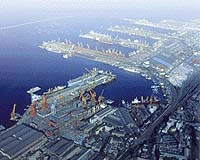| . |  |
. |
Tokyo (AFP) Nov 24, 2010 Japan moved a step further away from its dependence on China for rare earth materials Wednesday after trading house Sojitz said it had formed a strategic alliance with an Australian mining firm. Sojitz and Australia's Lynas are in talks to expand Japan's supply through a 10-year deal that would see the Japanese firm procure more than 9,000 tons of rare earths per year. A trade ministry official said this would satisfy more than 30 percent of Japanese demand if the deal went ahead. Rare earth minerals are used in everything from guided missiles to flat screen televisions and cars, and Japan's high-tech industry is the world's largest user. The announcement of the deal came as Japan's trade minister confirmed China had resumed rare earth shipments to the country, about two months after Tokyo said exports were being held up amid a territorial row. The dispute prompted Tokyo to intensify efforts to find alternative sources and wean itself off a dependence on China for more than 90 percent of its rare earths supply. On Tuesday, Australian Foreign Minister Kevin Rudd said the country was ready to be a long-term supplier of rare earths to Japan following a meeting with Japanese counterpart Seiji Maehara. Lynas is involved in the Mount Weld rare earth development project in western Australia and also a project in Malaysia. Sojitz and Lynas will jointly market Lynas' products in Japan and seek financing for the expansion of the Mount Weld project, the companies said in a statement Wednesday. "The two companies will investigate a long-term supply agreement to supply more than 9,000 tons per year over the next 10 years after the start of operation", which is expected to come in the third quarter of 2011, they said. Sojitz said it would seek financial assistance from the state-backed Japan Oil, Gas and Metals National Corp. (JOGMEC) for the project. Tokyo's row with Beijing stems from the arrest of a Chinese trawler captain whose vessel collided with Japanese patrol boats in waters near a disputed island chain in the East China Sea in September. Prosecutors released the captain after Beijing cut political, economic and cultural exchanges, but the dispute continued to simmer before more recent signs of a thaw. Since 2006, China has cut export quotas on rare earths by five to 10 percent a year. Production has also been slashed amid concerns that Chinese supplies could run out in 15 years. China's restrictions have spurred other countries such as the United States and Australia -- which have 15 and five percent of reserves respectively -- to resume production.
earlier related report Economy, Trade and Industry Minister Akihiro Ohata told a news conference that the Japanese government had confirmed the departure of two ships carrying rare earth minerals from China. While further details were not available, "we hope that other shipments will depart as soon as inspections are complete," Ohata said. Rare earth minerals are used in everything from guided missiles to flat screen televisions and cars, and Japan's high-tech industry is the world's largest user. China, which has a near-global monopoly on the minerals, has denied any embargo on shipments to Japan amid the territorial dispute, which has since shown signs of thawing. Last week Japan's Economy, Trade and Industry Ministry said 16 out of 27 surveyed companies that procure rare earths from China had reported "signs of improvement" such as actual loading on ships and faster customs clearance. Tokyo's row with Beijing stems from the arrest of a Chinese trawler captain whose vessel collided with Japanese patrol boats in waters near a disputed island chain in the East China Sea in September. Prosecutors released the captain after Beijing cut political, economic and cultural exchanges, but the dispute continued to simmer and nationalists in both countries have staged protests. Since 2006, China has cut export quotas on rare earths by five to 10 percent a year. Production has also been slashed amid concerns that Chinese supplies could run out in 15 years. China's restrictions on exports have spurred other countries such as the United States and Australia -- which have 15 and five percent of reserves respectively -- to resume production.
Share This Article With Planet Earth
Related Links Global Trade News
 Outside View: Chinese mercantilism
Outside View: Chinese mercantilismCollege Park, Md. (UPI) Nov 23, 2010 Ben Bernanke is right. Germany shouldn't blame easy money in the United States for the world's woes. Currency mercantilism in China and elsewhere is causing a mess - especially in the United States. Last week, Bernanke, the chairman of the U.S. Federal Reserve, fingered China, Taiwan, Singapore and Thailand for driving down the values of their currencies. Through massive government pur ... read more |
|
| The content herein, unless otherwise known to be public domain, are Copyright 1995-2010 - SpaceDaily. AFP and UPI Wire Stories are copyright Agence France-Presse and United Press International. ESA Portal Reports are copyright European Space Agency. All NASA sourced material is public domain. Additional copyrights may apply in whole or part to other bona fide parties. Advertising does not imply endorsement,agreement or approval of any opinions, statements or information provided by SpaceDaily on any Web page published or hosted by SpaceDaily. Privacy Statement |